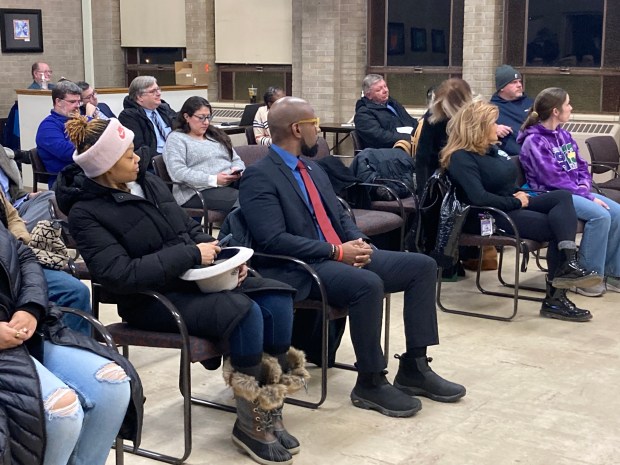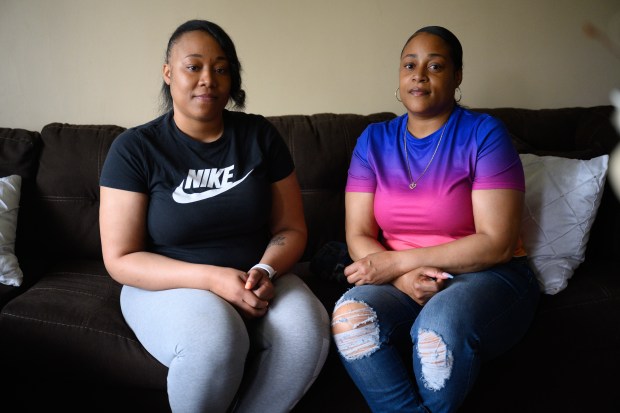Learning he was chosen high school principal of the year by his peers across Lake County, Daniel Hill did not talk about the progress that has been made at Waukegan High School, which he has guided from an underperforming to a commendable rating by the Illinois State Board of Education (ISBE).
Nor did Hill mention improving the graduation rate by six percentage points to 83%, or any of the other achievements he has had since he became co-principal of the school, overseeing its Washington campus for juniors and seniors.
Instead, he spread the credit around.
“I do not do this work alone,” Hill said. “The leadership team, they put in the work with me. The various advisory teams — the principal advisory, student advisory — are advising the work we do each and every day. (All these) people have helped me along the way.”
Hill was named High School Principal of the Year by the Lake Region of the Illinois Principals Association and honored for it at a meeting of the Waukegan Community Unit School District 60 Board of Education Tuesday at the Lincoln Center administration building in Waukegan.
Erica Berger, the association’s awards chair and the principal of the Diamond Lake School, said Hill was required to answer five questions in depth about the school and his administration of it, as well as providing three letters of recommendation from the school community.
“The process takes a deep dive into the candidate’s academic process, application of leadership and how they shape an overall community,” she said at the meeting. “We thank you for your leadership,” she added, noting he will now be considered for statewide recognition.
Born and raised in Chicago, Hill arrived in Waukegan in 2002 as a math teacher at Jacki Benny Middle School. He became an administrator there six years later. His first principal assignment was at Clearview Elementary School, taking the reins of the Washington campus in 2020.
Though Hill did not talk about his achievements — he did lay them out on his application — praise came from colleagues and members of the board. Board President Brandon Ewing, a product of Waukegan’s public schools, remembers him from the start.
“Twenty years ago, Principal Hill was Mr. Hill, and he was a math teacher at Jack Benny Middle School, one of two African American males who taught in that building,” Ewing said. “Having that representation of who you are, and who you have been, has been inspiring and an inspiration to me.”
Board member Carolina Fabian, who works for the ISBE, was a District 60 administrator before that. The parent of current district students, said she liked the way he was inclusive with families.
“It was amazing working with you as a parent,” Fabian said. “I don’t think we give our administrators enough credit when they’re out there. They’re visible, and their doors are open to the parents. Thank you for opening your doors and having those advisory committees for all of us to give input.”
Superintendent Theresa Plascencia, who placed Hill at the Washington campus, said his most frequently used words on the job are, “I can, I will, I am.” His involvement with the school and its community is constant.
“Not only are you a strong instructional leader, you’re a strong leader in this community,” Plascencia said. “Thank you for believing in the kids, and giving to our district even when they were recruiting you out of here. This is your home. This is who you are.”
Answering the questions posed by the principals association on his application, Hill was not shy about listing the accomplishments of the school and how it provided equity for students, as well as preparing them to live in a “global society.”
“We addressed potential biases, making our practices more consistent and supportive of all students,” Hill said in the application. “I have encouraged culturally responsive teaching, helping create a learning environment where every student feels represented.”
As students emerge into a constantly growing “global society,” Hill said in the application he has embedded “global competencies into our teaching and learning” by expanding language programs for a multicultural student body.
“Teachers (are) incorporating multicultural texts and perspectives that foster empathy and critical thinking,” he wrote. “Supporting multilingualism and cross-cultural experiences, we’ve expanded language programs.”





